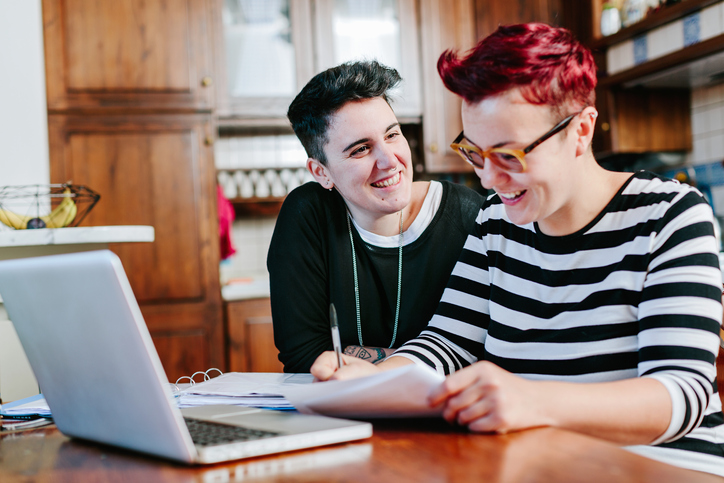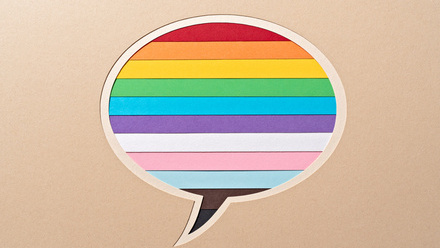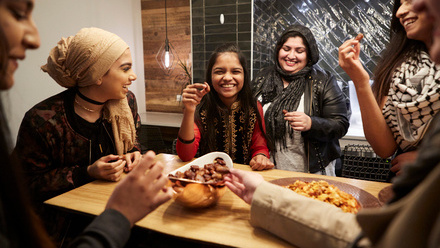Roza Jozefowicz considers how dietitians can promote health among LGBT+ people.
My six-year-old daughter came back from school one day and said: “When I grow up, I can marry whoever I want. Even a girl.”
She was both open minded and correct. Why aren’t we like Erica?
Before I attempt to answer this somewhat philosophical question, I probably should tell you more about how me writing this article has come about. I was asked to work on a summer internship project for the Division of Food, Nutrition and Dietetics at the University of Nottingham. It was to produce a short executive report, making recommendations to the nutrition and dietetics teaching teams on how the Division could develop teaching in the area of nutrition in LGBT+ health.
The brief asked for some insights in this area, as their teaching team wanted to incorporate the findings into future teaching and curriculum design. However, over the course of this work, the project developed into liaisons with respected professionals who have LGBT+ health interests at heart and are advocates for the community. To make the picture as complete as possible, I also approached students in the School of Biosciences and Health Sciences to allow them to air their views. I wanted to find out more about their experiences and their innate drive to raise the voices of dietitians for the LGBT+ community.

This article is a synthesis of my two-dimensional approach to this summer internship project. However, I am glad I can share views that arose from professional and personal experiences of people with whom I spoke.
Parameshwaran et al.1 have indicated that health professionals lack education on LGBT+ health needs, and this has resulted in reduced confidence when working with communities with diverse sexuality and/or gender identities. This translates into a “lack of consistent checks on preferred gender pronouns, or on which ward a transgender patient should be placed,” says Caroline Bovey, the Chair of the BDA.
This is echoed by Dr Kamilla Kamaruddin, GP in Transgender Healthcare, at East of England Gender Service Cambridge, who specialises in transgender healthcare. Even though many NHS Trusts have developed their equality and diversity procedures, student dietitians (such as myself), as emerging professionals, are often unsure how to confidently address LGBT+ health needs. “Not being sure about pronouns, or having a subconscious fear of asking personal questions, are only a couple of examples,” says Caroline.
One of the core modern values of dietetic practice is “Nihil de nobis, sine nobis”: Nothing about us, without us. Dr Kamilla said: “I think professionals should understand that transgender patients might have different needs. And also understand what hormones do to the body, because the hormones can change the fat deposition. Trans men gather fat around their abdomen, and end up with a ’beer belly’, and trans women will accumulate fat around their hips and bum. However, both can lead to medical conditions such as insulin resistance and type 2 diabetes. Therefore, it is important to follow a healthy diet pattern.” We concluded that the healthy diet would be that advocated by the Eatwell Guide.2
As AHPs, we have signed up to the professional values of our governing bodies (Association for Nutrition, British Dietetic Association, the Health and Care Professions Council), and yet many of us may struggle with the evolving practices towards supporting health and nutrition in the LGBT+ community.
From the conversations I shared with knowledgeable professionals in this field, there was a consensus that AHPs and other medical professions need to be trained on their courses on how to support the health needs of the LGBT+ community without external or internal bias. On my course, we have been trained on nutritional requirements across the lifespan, from birth to old age, including breastfeeding parents. We are taught the nutritional challenges through the lifespan faced by low-income client groups, or clients with obesity, and those who experience more clinical issues, such as cancer or diabetes. It is fair and right to give equal focus to nutritional challenges that the LGBT+ community might be facing.
However, the LGBT+ nutritional needs do not stand separate from the general population, and therefore the Eatwell Guide guidance applies.2 It is designed for the general population, without specific medical needs, and over the age of five. Dr Kamilla confirms that transgender patients are indeed advised to follow a healthy diet plan. She says: “Until there aren’t any medical justifications, all my service users should follow standard healthy eating advice, i.e. The Eatwell Guide.”
During my A placement I observed an MDT meeting. The dietitian was present, but silent. On another occasion, when I was being retrained during the pandemic and worked on inpatient wards as a therapy instructor, I observed that dietitians were either absent or silent during ward rounds. Why is it that as a profession our voices are often neglected? Nutrition is the key to good health and to improving patient care towards early discharge. Couldn’t dietitians be a force that influences others and advocates for change?
If we don’t raise our voices as a profession, no one will do it for us. The voice of the dietitian is one which can be powerful in supporting health and wellbeing for LGBT+ people.
We must seek a “real focus on exploring and eradicating bias and developing confidence in dietitians to ask relevant questions that matter,” says Sue Brierley- Hobson, Professional Lead for Dietetics at the Betsi Cadwaladr University Health Board (BCUHB), and the Head of Dietetics – Central for BCUHB.
I think the biggest change is in understanding what LGBT+ health means. We need to be thinking about how professionals approach and assess LGBT+ patients, supporting their identities whilst also not using them as a reason for their nutritional requirements. A study conducted by Safer and Pearce3 confirms the inclusion of LGBT+ health content in health profession education will result in increased student familiarisation and confidence when caring for transgender patients. “We need to ensure true inclusivity in providing nutritional and wider care,” adds Sue Brierley-Hobson. This valuable opinion was echoed by Dr Kamilla Kamaruddin, Caroline Bovey and Gareth Matthews (Queen’s Medical Centre in Nottingham).
From all the conversations I shared, and the research4-9 that was available to me on this important matter, I concluded that if we truly wish to improve inclusivity in our profession, we need to be more open, honest and transparent. Being open can start those very much-needed conversations around dietitians’ interests in and support for LGBT+ health and will result in growth in professional consciousness and confidence.
To achieve this there should be provision of education or training on accredited dietetics programmes to empower future professionals to feel prepared when working with LGBT+ people and communities.
The aim of my summer internship on LGBT+ health was to provide some advice on what improvements could be made on nutrition and dietetic courses to provide learning support for current and future students. Thus, it is of importance that professionals, both academic and clinical, who have experience in advocating for the LGBT+ community, should be a consistent feature on nutrition and dietetics courses. Guest lecturers from practice bring that much-needed diversity of experience. Courses should also offer more diverse case study scenarios during communication training, including clinical interactions with minority groups (sexual orientation and gender), which would allow future professionals to feel confident in their practice when asking questions that matter.
In addition, there should be yearly research projects carried out by final year students, exploring the ever-changing role of the dietitian in affecting social change. This will require support from universities, lecturers and project supervisors, as well as the support from Research Ethics Committees. Further liaising with the AfN, BDA and HCPC to share research findings to the wider professional community and improve educational provision, communications and collaboration in the sector, is needed to develop the role of nutrition professionals in supporting LGBT+ health.
Having received progressive training, dietitians and nutritionists can act as advocates for the LGBT+ community during MDT meetings. “To be trained to be inquisitive” could be an additional strength of our professions and would enable us “to explicitly capture protected characteristics and give a true meaning to this practice,” adds Caroline Bovey. Naturally, my recommendations seek to support and build upon the BDA Curriculum.10
I strongly believe that promoting health to everyone means inclusivity.
Jake Sallaway-Costello, Assistant Professor in Public Health Nutrition at the University of Nottingham, says: “If we can change behaviour, we can improve health outcomes, creating better quality of life and more equitable societies.” He challenges dietetics students, asking, “In a time when good nutrition has never been more important, how can we promote health?”
I strongly believe that promoting health to everyone means inclusivity. Therefore, I am asking: How fast can we promote this?
I am going to ask you to answer this question yourself, or with your family, your peers, work colleagues, managers and clients in practice. Let’s not leave this matter to open-minded children like Erica. Let's act now. Together we can go far.
References
- Parameshwaran V, Cockbain BC, Hillyard M, Price JR. Is the Lack of Specific Lesbian, Gay, Bisexual, Transgender and Queer/Questioning (LGBTQ) Health Care Education in Medical School a Cause for Concern? Evidence From a Survey of Knowledge and Practice Among UK Medical Students. J Homosex [Internet]. 2017 Feb 23;64(3):367–81. Available from: https://www.tandfonline.com/doi/full/10.1080/00918369.2016.1190218
- Standards Agency F. The Eatwell Guide (2020). https://www.food.gov.uk/sites/default/files/media/document/eatwell-guide-masterdigital.pdf [Accessed: 30 September 2020]
- Safer J, Pearce E. A Simple Curriculum Content Change Increased Medical Student Comfort with Transgender Medicine. Endocr Pract. 2013 Jul 1;19(4):633–7.doi:10.4158/EP13014
- Burt KG, Losak R, He H. Nutrition Professionals Feel Underprepared to Serve Persons With Marginalized Identities. [Internet]. 2022 Jun 17 [cited 2022 Sep 30];8(3):192–8. Available from: https://journals.sagepub.com/doi/full/10.1177/23733799221103216
- WORK REPORT LGBT IN BRITAIN (2018). The Stonewall Organisation. https://www.stonewall.org.uk/system/files/lgbt_in_britain_universities_report.pdf [Accessed: 5 October 2022]
- Earnshaw VA, Menino DD, Sava LM, Perrotti J, Barnes TN, Humphrey DL, et al. LGBTQ bullying: a qualitative investigation of student and school health professional perspectives. J LGBT Youth. 2020;17(3).
- UNIVERSITY REPORT LGBT IN BRITAIN. Stonewall Organisation. https://www.stonewall.org.uk/system/files/lgbt_in_britain_-_trans_report_final.pdf [Accessed: 6 October 2022]
- Bachmann Stonewall Becca Gooch YouGov CL. TRANS REPORT LGBT IN BRITAIN. (2018). The Stonewall Organisation. https://www.stonewall.org.uk/system/files/lgbt_in_britain_-_trans_report_final.pdf [Accessed: 3 October 2022]
- Kelley N, Santos R De. Public sentiment towards lesbian, gay, bi and trans people in the UK-June 2022 Evidence briefing. The Stonewall Organisation https://www.stonewall.org.uk/system/files/take_pride_-_june_2022.pdf [Accessed 6 October 2022]
- A Curriculum Framework for the pre-registration education and training of dietitians. British Dietetic Association (2020). https://www.bda.uk.com/uploads/assets/939f176b-8999-44f4-8c30a725baa7df28/BDACurriculum2020FINAL0505PRINT.pdf [Accessed: 5 October 2022]





